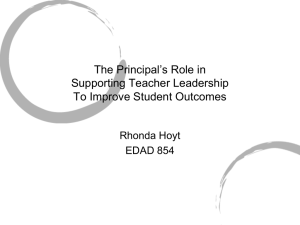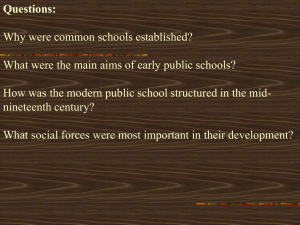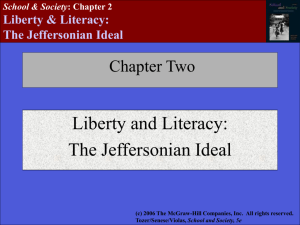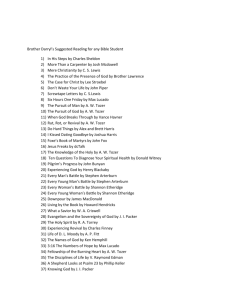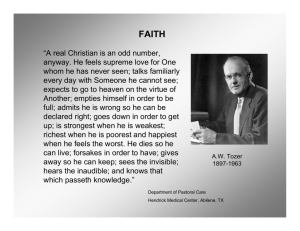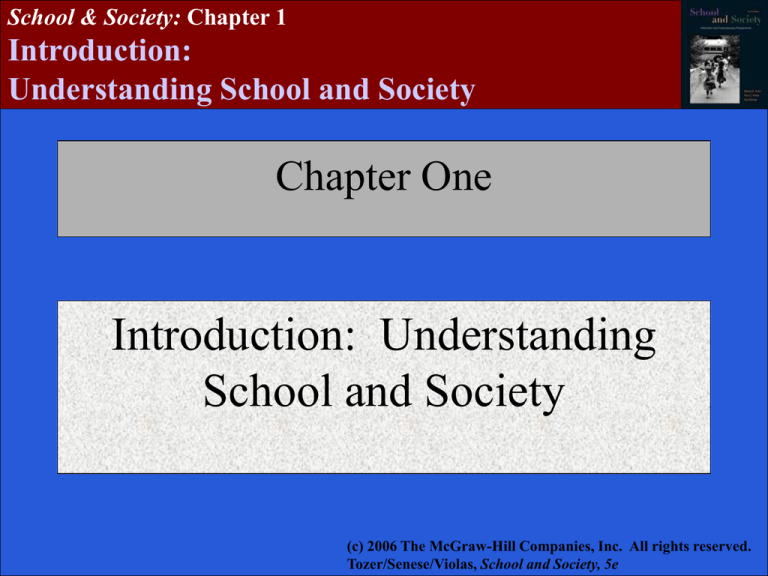
School & Society: Chapter 1
Introduction:
Understanding School and Society
Chapter One
Introduction: Understanding
School and Society
(c) 2006 The McGraw-Hill Companies, Inc. All rights reserved.
Tozer/Senese/Violas, School and Society, 5e
School & Society: Chapter 1
Introduction:
Understanding School and Society
Social foundations helps teachers to:
• Make sense of classroom situations by
understanding the larger social context of
culture, social and economic class, gender,
race, etc.
• Make the best decisions for all students
• Continually evaluate teaching goals and
methods
(c) 2006 The McGraw-Hill Companies, Inc. All rights reserved.
Tozer/Senese/Violas, School and Society, 5e
School & Society: Chapter 1
Introduction:
Understanding School and Society
Tools of Inquiry
-Social theory
-Training
-Education
-Schooling
-Political economy
-Ideology
(c) 2006 The McGraw-Hill Companies, Inc. All rights reserved.
Tozer/Senese/Violas, School and Society, 5e
School & Society: Chapter 1
Introduction:
Understanding School and Society
Social Theory
• An attempt to make sense of and explain social
phenomena
• An attempt to explain reality and practice
• Should be internally consistent, account for the
data, and agree with other relevant theory
• Neither “the absolute truth” nor “just another
interpretation”
(c) 2006 The McGraw-Hill Companies, Inc. All rights reserved.
Tozer/Senese/Violas, School and Society, 5e
School & Society: Chapter 1
Introduction:
Understanding School and Society
Schooling
• The totality of experiences occurring within
the institution of “school”
• Formal curriculum, extracurricular
activities, “hidden curriculum”
• Reflects the influence of government
(c) 2006 The McGraw-Hill Companies, Inc. All rights reserved.
Tozer/Senese/Violas, School and Society, 5e
School & Society: Chapter 1
Introduction:
Understanding School and Society
Training
• Preparation for specific roles or to improve
one’s skills
• Goals generated by the trainer
• Potential for indoctrination?
• Necessary in some situations (driving)
(c) 2006 The McGraw-Hill Companies, Inc. All rights reserved.
Tozer/Senese/Violas, School and Society, 5e
School & Society: Chapter 1
Introduction:
Understanding School and Society
Political Economy
• Social, cultural, economic, political, and
demographic dimensions of a society
• How a society is organized in order to
function
(c) 2006 The McGraw-Hill Companies, Inc. All rights reserved.
Tozer/Senese/Violas, School and Society, 5e
School & Society: Chapter 1
Introduction:
Understanding School and Society
Education
Promotes the skills and understandings to:
• Develop a wide range of human capacities
• Prepare for a wide range of roles
• Nourish reason, intellect, intuition, and
creativity
(c) 2006 The McGraw-Hill Companies, Inc. All rights reserved.
Tozer/Senese/Violas, School and Society, 5e
School & Society: Chapter 1
Introduction:
Understanding School and Society
Ideology
• Society’s justification for its political,
social, and economic arrangements
• The beliefs, value systems, and
understandings of social groups
• Almost always created and articulated by
the dominant group (the “dominant
ideology”)
• Embedded in ALL societies
(c) 2006 The McGraw-Hill Companies, Inc. All rights reserved.
Tozer/Senese/Violas, School and Society, 5e
School & Society: Chapter 1
Introduction:
Understanding School and Society
Schooling & Culture in Classical Greece
• Political economy
Citizens—owned property, opportunity to participate in
government
Non-citizens
• Women—proper place was in the household
• Slaves—private property (“chattel”)
• Metics—neither slaves nor citizens; worked in
variety of occupations
(c) 2006 The McGraw-Hill Companies, Inc. All rights reserved.
Tozer/Senese/Violas, School and Society, 5e
School & Society: Chapter 1
Introduction:
Understanding School and Society
Schooling & Culture in Classical Greece
• Ideology
Reason revealed workings of natural world
Virtue facilitated harmony with the universe
Citizens participated in the political democracy, and therefore
“lived freely,” because of their superior rational capacity
• Schooling
Available to young boys and men
Gymnastics, music, and literature
Avoidance of vocations; preparation for leisure
(c) 2006 The McGraw-Hill Companies, Inc. All rights reserved.
Tozer/Senese/Violas, School and Society, 5e
School & Society: Chapter 1
Introduction:
Understanding School and Society
Concluding Remarks
• Good theory is useful in identifying and
explaining phenomena—including practice.
• The interaction of political economy, ideology,
and schooling (analytic framework) are important
focus of the social foundations of education.
• Meaning depends on context, and understanding
meaning requires inquiry. Teachers must be active
participants in this inquiry.
(c) 2006 The McGraw-Hill Companies, Inc. All rights reserved.
Tozer/Senese/Violas, School and Society, 5e
School & Society: Chapter 1
Introduction:
Understanding School and Society
Developing Your Professional Vocabulary
-Athenian citizenship
-Athenian slavery
-democracy
-education through
participation
-ideology
-training versus education
-political economy
-schooling versus
education
-social foundations of
education
-social theory
(c) 2006 The McGraw-Hill Companies, Inc. All rights reserved.
Tozer/Senese/Violas, School and Society, 5e

